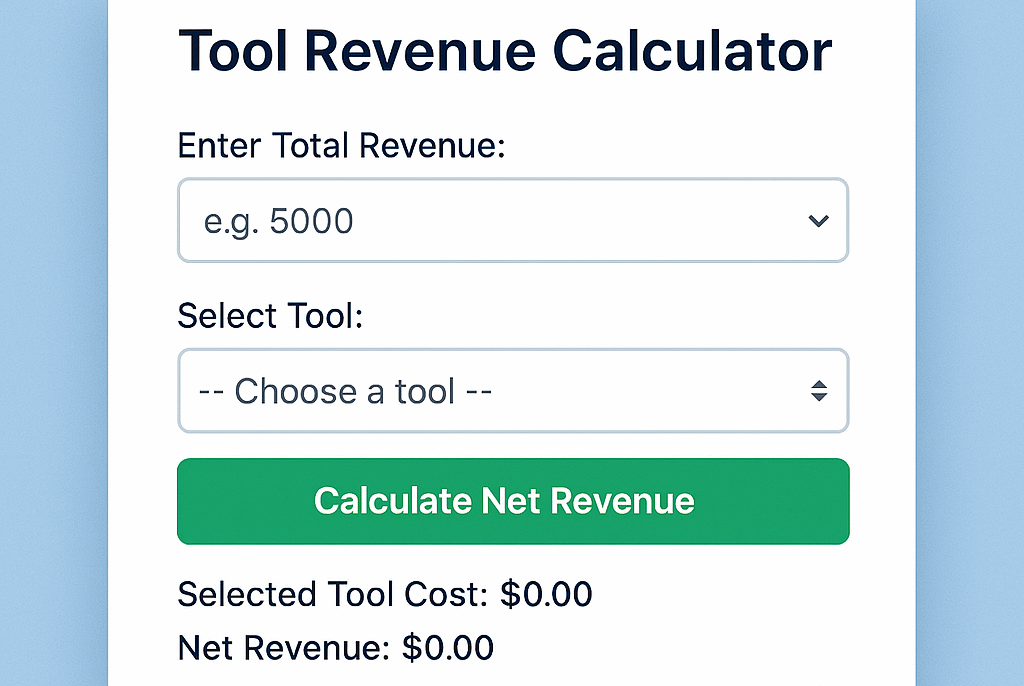In today’s fast-paced digital world, businesses must stay competitive to attract and retain customers. Marketing is no longer limited to traditional methods, such as print ads or word-of-mouth. Instead, it relies heavily on digital strategies, data-driven campaigns, and automated systems. This is where marketing tools become essential. From social media scheduling to email automation, analytics, and SEO software, marketing tools simplify tasks, save time, and maximize results.
In this article, we will explore the major benefits of marketing tools and why every business—big or small—should leverage them.
Tool Revenue Calculator
1. Save Time with Automation
One of the greatest advantages of marketing tools is automation. Tasks such as sending emails, posting on social media, or managing ad campaigns can consume hours of manual work. Tools like Mailchimp, Buffer, or HubSpot allow businesses to automate repetitive processes. For example, you can schedule emails to send automatically at the right time or set up social media posts weeks in advance.
By automating marketing tasks:
Teams spend less time on manual work.
Campaigns are delivered consistently and on schedule.
Business owners can focus on strategic growth instead of day-to-day operations.
2. Improve Customer Targeting
Marketing tools help businesses understand their audiences better. Analytics software and customer relationship management (CRM) systems gather data about customer behavior, preferences, and purchase history. With this insight, businesses can target customers with personalized offers, improving conversion rates.
For instance:
Email marketing platforms can segment subscribers based on location, interests, or buying history.
Ad tools like Google Ads or Facebook Ads Manager allow you to reach specific demographics with precision.
SEO tools show which keywords your target audience is searching for.
Better targeting leads to higher engagement and ensures your marketing budget is spent efficiently.
3. Enhance Collaboration and Team Efficiency
For companies with multiple team members, marketing tools make collaboration seamless. Project management tools like Trello, Asana, or Monday.com keep everyone on track. Content calendars and workflow tools ensure that campaigns are executed smoothly without duplication or missed deadlines.
Collaboration benefits include:
Clear assignment of roles and responsibilities.
Centralized communication within one platform.
Real-time updates on project progress.
This efficiency ensures marketing campaigns are launched on time and achieve their intended results.
4. Gain Valuable Insights with Analytics
Without data, it’s impossible to measure whether a marketing strategy is working. Marketing tools provide detailed analytics to track performance across different channels. For example:
Google Analytics shows website traffic, sources, and user behavior.
Email marketing software provides open rates, click-through rates, and conversions.
Social media dashboards display engagement, reach, and follower growth.
These insights allow businesses to adjust strategies, eliminate ineffective campaigns, and double down on what works. Data-driven decisions lead to better ROI (return on investment).
5. Strengthen Online Presence
In today’s digital marketplace, visibility is everything. Marketing tools help businesses build and strengthen their online presence through SEO, content marketing, and social media. For example:
SEO tools like SEMrush and Ahrefs help identify high-ranking keywords, track backlinks, and monitor competition.
Content planning tools suggest trending topics that can drive more traffic.
Social scheduling tools ensure consistent engagement with followers.
A strong online presence builds brand authority, attracts more customers, and creates trust.
6. Cost-Effective Marketing
Traditional advertising, such as TV or print ads, can be expensive and difficult to measure. Digital marketing tools provide cost-effective alternatives that deliver measurable results. Small businesses can run targeted ad campaigns with a fraction of the budget required for traditional advertising.
Some cost benefits include:
Spending only on the right audience through targeted ads.
Free or affordable plans offered by many marketing tools.
Maximized ROI by monitoring campaigns in real-time and making quick adjustments.
7. Personalization for Better Customer Experience
Modern customers expect personalized experiences. Marketing tools make it possible to tailor messages and offers to individual customers. For example:
An email tool can send customized product recommendations.
A chatbot can provide instant responses based on customer inquiries.
CRM systems store purchase histories to create personalized loyalty programs.
Personalization increases customer satisfaction and encourages repeat purchases.
8. Stay Ahead of Competitors
In competitive industries, businesses that use marketing tools often gain an edge. Competitor analysis tools allow companies to monitor their rivals’ strategies, ad performance, and keyword rankings. By knowing what works for competitors, businesses can adapt quickly and stay ahead.
9. Scalability and Growth
As your business grows, manual marketing becomes impossible to manage. Marketing tools scale with your business, handling larger audiences, multiple platforms, and more complex campaigns. Whether you’re running a small e-commerce store or an international brand, the right tools ensure your marketing remains efficient and effective.
Conclusion
Marketing tools are no longer optional—they are essential for modern business success. They save time through automation, improve targeting, enhance collaboration, and provide valuable data insights. By building a strong online presence and offering personalized experiences, businesses can increase customer loyalty and maximize growth.
Investing in the right marketing tools not only saves money but also helps businesses scale and stay competitive in the digital marketplace.
If you want your marketing campaigns to be smarter, faster, and more effective, now is the time to embrace the power of marketing tools.



